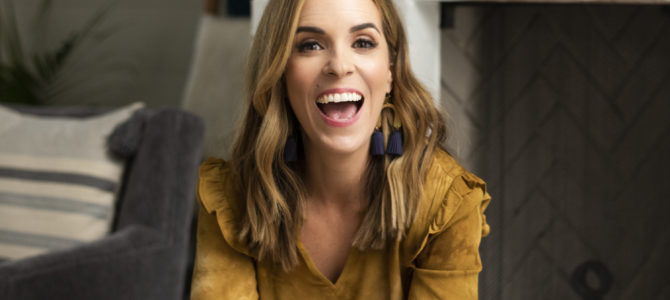Lifestyle influencer and self-help author Rachel Hollis has an authenticity problem. It’s not a lack of authenticity, as that’s what her millions Instagram and Facebook followers flock to her morning live streams and popular podcast for. Rather, the moment she moves to monetize the “unfiltered honesty” and inspirational girl boss brand she’s built, it becomes inauthentic, and even worse, boring.
Such is the case with Hollis’s new show on Quibi, the app that sells “quick bite” episodes of entertainment in an attempt to fill in the gap between short videos on social media and traditional half-hour television episodes. “The Rachel Hollis Show” boldly claims to teach viewers how to “level up your life,” in daily videos that usually run less than six or seven minutes.
Each episode has two segments that follow a broad weekly theme like community, relationships, or finances. The first half always features Hollis, standing in a bright white studio giving a monologue that echoes the self-help style of her popular books.
The second half, usually with only a few minutes to spare, features Hollis explaining a miscellaneous lifestyle tip or activity. In less than two or three minutes, she demonstrates an exercise routine, how to ask your boss for a raise, or how to “jazz up” your iced tea.
https://www.facebook.com/TheChicSite/posts/10158416265171259
Just like her best-selling books, there’s nothing particularly unique or provocative about the ideas presented on “The Rachel Hollis Show,” although that hasn’t stopped women from turning to her for inspiration. It’s easy to criticize Hollis as self-absorbed and fame-seeking, as anyone who has followed her career from L.A. event planner to blogger to media mogul wannabe knows. (She writes in one book about having the word “mogul” tattooed on her wrist).
Unsurprisingly, that same self-absorption comes through in her Quibi monologues, mostly centered on how awesome she is at community, relationships, finances, etc., but at least that’s on-brand for her. The failure of the show is that it’s just not very interesting.
What’s more interesting, and more authentic, are her live broadcasts on Facebook and Instagram, which used to be an informal, faux daily morning show with her husband (and business partner) before they announced their divorce earlier this summer. She still hops on in the mornings every few days or so, sitting on her bedroom floor or at her kitchen island, responding to feedback from readers and podcast listeners, but also gabbing about her week’s grocery list or the struggle of getting her kids’ online school sessions running that day.
“The Rachel Hollis Show” is perfectly polished and produced, but it falls flat because it doesn’t feel like what her usual viewers — the working moms and millennial girl boss crowd — get when they see the everyday life “Rachel Hollis Show” streaming on social media after kids are dropped off at school. The Quibi show is in a studio, when it should be in her dirty kitchen or in her bedroom hiding from her four kids, just like her audience is.
In addition to the production, the content of the Quibi show also seems written by a producer who was flipping through Pinterest, instead of the kinds of “honest” blog posts Hollis wrote before her media mogul days. She used to walk readers through what it’s like getting a boob job, or how she felt about posting a photo of her stretch marks. On Quibi, those relatable, nuanced topics are swapped out for vague pep talks on communicating with your partner, then bookended with how to make a “S’mores Bar” in 60 seconds.
In some ways, it’s unsurprising Hollis’s approach to Quibi was to trade authenticity for production value. After all, the nature of “quick bite” videos means episodes have to be edited efficiently with a nice little bow around the small package, as opposed to her casual conversation with commenters for almost half an hour.
Quibi executives, and Hollis herself, should consider if they would have not been better off asking for a shorter version of her existing daily show, bedroom floor lighting and all. If it is possible to monetize true authenticity, Rachel Hollis would be the one to try.









